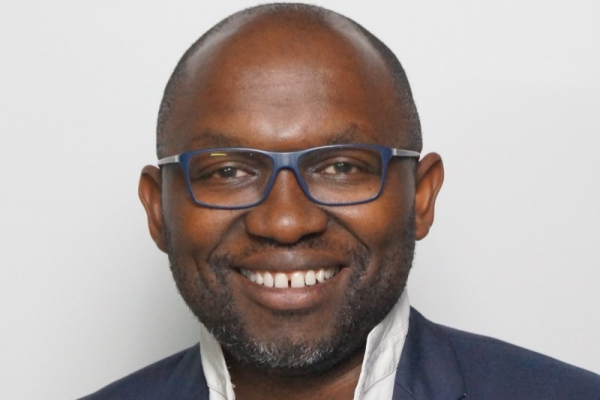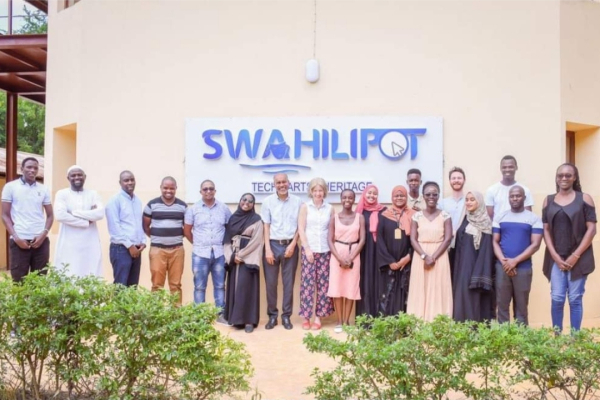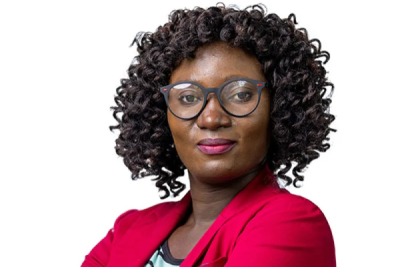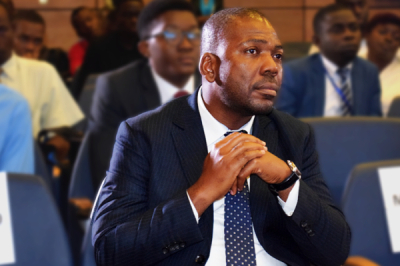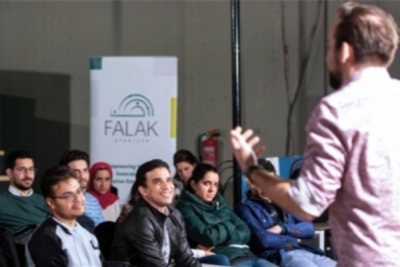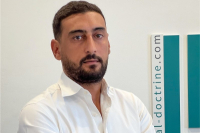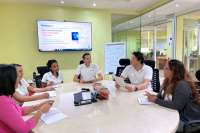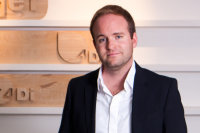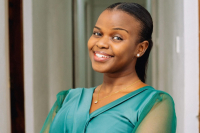
TECH STARS (1007)
His career in the pharmaceutical industry has given him valuable expertise in health economics. In 2019, he founded an app to facilitate access to healthcare for disadvantaged people in Africa.
Brice Kitio Dschassi (photo) is a pharmacist and health economist with over 15 years of experience. He is the founder and CEO of WiiQare, a Congolese startup whose mission is to improve access to healthcare for people in Africa by connecting healthcare providers, patients, and payers.
Established in 2020, WiiQare is an innovative loyalty and rewards-based health savings and payment solution that empowers individuals to take control of their healthcare with fun and easy ways to build health savings and provides hospitals with a seamless way to receive payments from patients.
WiiQare aims to meet the needs of populations who lack access to social coverage or health insurance, or who face financial difficulties in accessing healthcare. The platform also reduces the risk of corruption or misappropriation of funds sent by expatriates.
Dschassi holds a doctorate in pharmacy from Claude Bernard Lyon 1 University (2001) and a master's degree in pharmaco-epidemiology and pharmacovigilance from Bordeaux University (2005). He is also a graduate of Université Paris-Sud, where he obtained a Master's degree in Public Health (MPH) specializing in methodology and statistics in 2005.
Between 2005 and 2009, he was a lecturer in pharmaco-epidemiology at Université Claude Bernard Lyon 1, and project manager for the Haute autorité de santé, an independent French public scientific authority that promotes quality in the health, social, and medico-social sectors. In 2009, he joined the pharmaceutical company Sanofi, where he worked for six years. In 2016, he became Lundbeck's Director of Global Health Economics and Outcomes Research. Lundbeck is a pharmaceutical company specializing in brain diseases.
Melchior Koba
Since its inception, the hub has been committed to enabling young people to unleash their full potential through a variety of programs. It provides a supportive community space that enables young people to meet, network, and learn, among other things.
Founded in 2016 by Mahmoud Noor, Swahilipot Hub began as a Kenyan non-profit focused on technology and innovation. In 2017, it expanded its mission to include art, becoming the Swahilipot Hub Foundation and amplifying its impact on young people's lives.
Swahilipot Hub Foundation equips young people with the tools they need to thrive in the digital age. Its Data and Research program trains participants in data collection and analysis, while other programs enhance digital skills and enable young people to navigate the ever-evolving digital landscape.
Through its Industry Attachment program, participants gain practical experience in areas such as web development, networking, and soft skills such as working with young people and effective communication.
Its enterprise program, known as "Pitching Thursday", provides a platform for young people to present their ideas and projects, gaining valuable feedback and visibility. This program serves as a springboard for growth and development. The hub also provides a unique space where young artists and technologists can build sustainable projects. In 2018, it hosted the first edition of Pwani Innovation Week (PIW), its activity focused on promoting technology. The organization also launched a heritage event in 2022. Named Modern Heritage of Africa (MoHoA) and organized in a hybrid format (face-to-face and virtual workshop), the event brought together speakers and participants from all over the world.
To date, it has trained over 100 young people in data collection and analysis, and over 150 young people have acquired digital skills. It has supported more than 10 businesses to date, helping them on their entrepreneurial journey.
Earlier in 2023, the organization was certified as the equivalent of a certified public charity in the United States of America. This means it can be directly funded by US grant-making bodies.
Melchior Koba
A leader in healthcare innovation across Africa, she leverages her company Kaaro Health to bridge the urban-rural healthcare gap, ensuring access to quality care for underserved communities.
Angella Kyomugisha (photo) is a social entrepreneur and financial management specialist dedicated to enhancing healthcare accessibility in rural Africa. A graduate of Kyambogo University, where she earned her bachelor's degree in economics and statistics in 2013, she serves as the co-founder, co-CEO, and CFO of Kaaro Health.
Her entrepreneurial journey was motivated by a harrowing experience during which she nearly lost her life and that of her prematurely born baby. This incident revealed the stark health disparities faced by rural women in Uganda, prompting Kyomugisha to establish Kaaro Health.
Reflecting on her experience earlier this year, she stated, "My baby and I spent three months fighting for our lives. In short, we survived, but it was really traumatic. I didn't understand what women who live in rural areas go through."
Founded in 2014, Kaaro Health pioneers the use of "container clinics," equipped with solar power, laboratory facilities, and an Internet connection, serving as telehealth centers for villages lacking clinics within a 25 km radius.
Beyond healthcare provision, Kaaro Health offers targeted financial management training to both current and potential customers, empowering them with the skills necessary to develop and sustain their businesses. The organization's goal is to support medical entrepreneurs and their SMEs in delivering increasingly sophisticated healthcare to rural and peri-urban communities.
In addition to her role at Kaaro Health, Kyomugisha serves as a board member of the Delight Children's Health Rights Initiative, a non-governmental organization dedicated to safeguarding the rights of mothers and children. Prior to her entrepreneurial endeavors, she held positions such as banking mission manager at Centenary Bank (2013-2014), project manager for Smart Telecom (2014), and fundraising manager for the Forum for African Women Educationalists (2015).
Angella Kyomugisha received the Women Empowerment Award from the Bayer Foundation in 2021. She was selected as one of the Cartier Women's Initiative Fellows in 2023. These awards underscore her commitment to driving positive change and making healthcare more accessible across the continent.
Melchior Koba
In Africa, agriculture plays a critical role in driving economic development, social stability, and food security. Recognizing its importance, organizations like 3AgHub are actively supporting agricultural startups to bolster the sector's growth and impact.
Agripreneurs Africa Agribusiness Hub (3AgHub) is a virtual incubator and accelerator, designed to develop agripreneurs capable of revolutionizing the agribusiness landscape. Operating out of Ghana, it provides comprehensive and interactive startup support, training, mentoring, and industry best practices.
Established in 2021, this incubator takes a hands-on approach, coaching, engaging, inspiring, and equipping agripreneurs from the initial stages of ideation through the creation of dynamic agribusinesses with transformative potential. By leveraging these initiatives, 3AgHub actively contributes to the creation of sustainable employment opportunities, curbing migration, mitigating youth unemployment, boosting household incomes, promoting agripreneurship, and strengthening food and nutritional security.
The centerpiece of 3AgHub's offerings is its six-month incubation program, affording agripreneurs the chance to test and develop prototypes, ultimately laying the foundation for their startup ventures. Through this program, 3AgHub not only recommends innovative and sustainable solutions but also provides implementation support, streamlining access to essential resources. The goal is to assist young graduates in translating their ideas into viable businesses capable of generating employment and offering inventive solutions within the agri-food sector.
Its 3-month 3AgHub accelerator program aims to equip young agri-businesses to become resilient, competitive, and sustainable. During the program, the center shares its expertise, networks, and resources. It helps entrepreneurs develop a better go-to-market strategy, prepare for investment, and raise financial resources.
3AgHub's comprehensive suite of services encompasses investment in accelerators and incubators, business development, market facilitation, technical assistance, and advisory services, input facilitation and mechanization, value chain development, investment appraisal and facilitation, financial support for SMEs, as well as internship and volunteering opportunities.
Fostering collaboration and expanding its reach, 3AgHub has forged strategic partnerships with numerous organizations, both within Ghana and on the international stage. Noteworthy collaborators include the Ghana Export Promotion Authority, the National Board Small Scale Industries, Agripreneurs Africa, and the African Agribusiness Incubators Network.
Melchior Koba
Alex Sea is a prominent figure driving innovation and development in the digital finance sector across French-speaking Africa. His work with the Africa Fintech Forum catalyzes groundbreaking initiatives and advancements.
Alex Sea (photo) is a key player in the fintech ecosystem in French-speaking Africa. As founder and director of the Africa Fintech Forum (AFF), a non-profit organization, Alex fosters connections and collaboration across the continent's diverse financial innovation ecosystems.
Established in 2017, AFF is dedicated to fostering the growth of Africa's fintech industry. The organization serves as a valuable information hub, demystifying the intricacies of the market and enriching knowledge through initiatives like the Africa Fintech Chair and in-depth mapping of the French-speaking African fintech landscape.
"Africa Fintech is an international forum convening over 400 digital finance players from five continents for two days annually. We collaborate to build the foundation for thriving fintech ecosystems across Africa through a diverse range of initiatives. Additionally, the Africa Fintech Tour reaches over 10 African countries every year, unlocking the vast potential of digital finance. To this end, we actively establish and support vibrant fintech communities throughout French-speaking West and Central Africa," Alex Sea explained in 2020.
AFF actively collaborates with regulators, government agencies, financial centers, and technology parks to strengthen the ecosystem. In 2020, the organization launched Fintech Village, a continental hub dedicated to fostering synergy between African fintech ecosystems, financial centers, and technology hubs. This initiative aims to identify and support innovative, inclusive technologies.
The Next Fintech Forum is AFF's flagship annual event. The fifth edition, held in Côte d'Ivoire on November 16-17, 2023, focused on fintech and commerce in Africa.
Beyond AFF, Alex Sea's commitment to the African financial landscape extends far and wide. He holds a Master's degree in business and strategy management and co-founded AFRICAM ACADEMY, an innovation hub specializing in market finance. He also serves as Vice-Chairman of the Africa Fintech Network, a platform that unites leaders, organizations, and stakeholders in the African fintech space. Additionally, he is the Secretary General of the Côte d'Ivoire Fintech Association. He co-founded Africa Lab, an incubator and accelerator, and Finov Africa, a consulting and investment firm dedicated to the fintech ecosystem, where he has served as CEO since 2019. He is also the founder and CEO of IDIA AFRICA, a consultancy specializing in business intelligence, market penetration, and risk analysis.
In 2016, he established Africa Telecom & Technology Review, a platform to educate and inform audiences about Africa’s dynamic and rapidly evolving market. The following year, he founded Datacenter & Cloud Conference, which highlights market trends and opportunities for African players in the digitalization space.
Melchior Koba
Driven by a commitment to fostering entrepreneurship and innovation, the Egyptian government, through the Ministry of International Cooperation, established Falak Startups. This accelerator actively empowers ambitious technology-focused entrepreneurs, nurturing their growth and propelling the nation's tech ecosystem.
Falak Startups is an accelerator established in 2018 by the Egyptian Ministry of International Cooperation and its venture capital agency, Egypt Ventures. Currently led by Ahmed Hazem Dakroury, an experienced investment professional, it strives to identify and nurture talented entrepreneurs, fostering their growth within the Middle East and African entrepreneurial landscape.
Dedicated to supporting diverse ventures, Falak Startups provides two distinct tracks for startups: a general track for technology-focused ventures and a fintech track –supported by EFGEV– designed specifically for startups operating in the financial technology sector.
The tracks offer selected companies tailored support, including workshops, mentoring, training, market opportunities, and exclusive access to Falak Startups’ virtual platform, Virtual Stage. This platform facilitates connections between startups and potential investors, policymakers, private sector players, and institutional partners.
In addition to its accelerator programs, Falak Startups has initiated a venture capital investment program to fund startups with up to EGP 2 million (approximately $65,000) each. This program extends financial support to startups seeking additional funding from various sources.
Since its inception, Falak Startups has successfully accelerated numerous emerging ventures across diverse sectors, including energy, digital health, online education, e-commerce, and logistics. Notable companies that have benefited from Falak Startups' support include Presto, an automated on-demand delivery system; Mayday, a real-time roadside assistance provider for motorists; Rabbit, a clean transportation company offering electric scooters for rent by the minute; and the e-commerce platform WXYZ.
Melchior Koba
Leveraging his extensive legal and financial expertise honed at leading firms like KPMG and PwC, this entrepreneur is now building a platform that simplifies access to legislation, regulations, and court rulings across his target markets.
Walid Ghanemi (photo), an Algerian entrepreneur, is leading a revolutionary transformation in the African legal landscape through his startup, Legal Doctrine, where he serves as the founder and CEO. Ghanemi earned his bachelor's degree in business law in 2012 and a master's degree in accounting, control, and auditing in 2015 from the Algerian Higher School of Business (ESAA).
In 2018, he established Legal Doctrine, a legaltech startup that aggregates and publishes legislation, regulations, and court rulings from Algeria, Tunisia, Morocco, Senegal, Côte d'Ivoire, and Cameroon. The platform, leveraging artificial intelligence, offers a comprehensive and accessible repository for legal professionals, including lawyers, students, and businesses, providing them with in-depth analysis of legislative and regulatory texts for current and relevant information.
As arguably the first legaltech in Algeria, Legal Doctrine boasts a user base exceeding 4,000 customers who utilize its legal search engine to enhance efficiency and save time in their research endeavors. The company's contributions to the field have earned it the title of "Best African Legaltech Startup" twice, first in 2018 in Zurich and again in 2019 in Tunis.
Beyond Legal Doctrine, Walid Ghanemi also founded Algiers Arbitration Day, an annual event that convenes international arbitration practitioners to delve into the latest developments, emerging trends, and critical issues in the arbitration landscape across Algeria, Africa, and the Middle East and North Africa region.
He is also the President and CEO of the Algiers Business Law Institute. He entered the professional world in 2007 at CMS Francis Lefebvre Avocats, where he worked as a lawyer. Over the years, he transitioned to roles such as financier at Alstom Group in 2012 and tax specialist at KPMG Algeria in the subsequent year. From 2015 until the inception of Legal Doctrine, he served as an associate senior financial and tax auditor at PwC.
Melchior Koba
In 2022, Mauritius achieved a score of 1.02 points on the Startup Ecosystem Index, placing it among the highest-ranked African nations in this category, according to data released by StartupBlink. This performance can be attributed in part to the vital role played by the Mauritius Start-up Incubator.
Mauritius Start-up Incubator (MSI) is a support hub for burgeoning enterprises seeking growth and guidance in Mauritius. Established in 2016 by entrepreneur Nicolas Goldstein, MSI distinguishes itself by providing comprehensive support services, encompassing the entire journey from launch to the establishment of successful businesses.
At MSI, startups benefit from an optimal growth environment featuring modern facilities, access to a network of experts and mentors, tailored training sessions, workshops, and crucial financial and administrative support. The fully-equipped incubator offices, wired and furnished with 1 to 25 workstations, boast advanced internet technology.
Beyond physical infrastructure, MSI extends its support to consulting services for staff recruitment and aids in the establishment and accounting processes for companies in Mauritius. The incubator facilitates trademark registration, assists in securing occupation permits (OP) for expatriates, and guides businesses through various administrative procedures.
Moreover, MSI also advises companies interested in establishing themselves in Mauritius, offering insights on company incorporation, networking with offshore management entities, and navigating the complexities of obtaining work permits, occupancy permits, or other necessary authorizations for digital enterprises.
Its backers include financial institutions like Banque des Mascareignes, Barclays, Standard Bank, Bank One, MAU Bank, and Mauritius Commercial Bank, among others. They also include major corporations like Harel Mallac Group, Evaco Group, and CIEL Group.
Melchior Koba
In Africa, startups often need more funding to expand operations but most of them lack access to financial support. Justin Stanford aims to address this issue through his South Africa-based venture, 4Di Capital.
Justin Stanford (photo) is a South African self-taught engineer, entrepreneur, investor, and venture capitalist deeply committed to fostering innovation within the African technology ecosystem. As the Co-founder and General Partner of 4Di Capital, a venture capital firm headquartered in Cape Town and Atlanta, he is focused on supporting and financing high-potential technology startups.
Established in 2009, 4Di Capital, under Stanford's leadership focuses on providing crucial financial backing to African technology entrepreneurs. The firm concentrates its investments in key sectors such as digital health, online education, fintech, green technology, transport, and infrastructure. Noteworthy companies within 4Di Capital's portfolio include Aerobotics, LifeQ, Talk 360, Wasoko, and VALR.
Justin Stanford's journey into entrepreneurship began with a bold move when driven by a passion for technology, he left high school in 2000. In 2003, he co-founded ESET Southern Africa, a company dedicated to distributing ESET's high-end Internet security products in the Southern Africa region. He currently serves on the company's Board of Directors.
In 2009, he took a pivotal step in advancing South Africa's tech landscape by co-founding The Silicon Cape Initiative, a non-profit community movement. The initiative aims to foster the growth of technology startups in South Africa, with a particular focus on the Western Cape region.
"The potential we saw in the very nascent, siloed, and undeveloped local tech startup ecosystem eventually led to us founding the Silicon Cape Initiative in 2009 with my friend Vinny Lingham, to try and kickstart and catalyze things, and the creation of 4Di Capital as a Valley-style early-stage tech VC fund here in South Africa," the South African entrepreneur said, in 2015, on the reasons that prompted the creation of 4Di Capital.
Over the years, he has received numerous national and international accolades. In 2011, the Mail & Guardian ranked him among the top 200 young South Africans, and in 2013, Forbes listed him in the prestigious 30 Under 30 category of Africa's best young entrepreneurs. From 2014 to 2018, he consistently appeared on the Choiseul Institute's Choiseul 100 Africa: Economic Leaders for Tomorrow list. In 2017, he secured a spot on the inaugural list of the 100 most influential young South Africans.
Melchior Koba
The founder of the TechHorizon-Tanzania program, Caroline Mohoni, is passionate about community education. In this interview, she introduces the initiative she currently champions for women in ICT-related matters.
We Are Tech: What is TechHorizon?
Caroline Mohoni: TechHorizon-Tanzania is a program that aims to bridge the digital divide in Tanzania through comprehensive training in digital and ICT skills. It caters to everyone, from those with a background in technology looking to enhance their expertise to those without technological training seeking foundational knowledge to foster innovation for self-employment or improvement in their current endeavors.
TechHorizon offers four services: an online learning platform providing courses in digital skills; community technology centers offering access to digital resources, physical training spaces, and community development activities to address the urban-rural digital gap; practical education workshops in digital skills and mobile technology extending training to remote areas; and a digital empowerment program focused on women and girls, equipping them with digital skills to reduce the gender gap in tech education and employment.
TechHorizon-Tanzania envisions significant empowerment, improved employability, educational progress, and community development. It aligns with SDGs 4 (Quality Education), 5 (Gender Equality), and 8 (Decent Work and Economic Growth).
We Are Tech: What inspired the creation of TechHorizon Tanzania?
Caroline Mohoni: The program, initially named "ICT Basic Skills with Caroo," was born in September 2021 after realizing that 60% of Tanzanians lack basic digital skills, with rural areas being even more disadvantaged as 80% of people in those areas have no access to digital technologies. Women, in particular, are disproportionately affected, with only 13% having access to the internet compared to 21% of men.
We Are Tech: What has the program achieved so far?
Caroline Mohoni: Regarding user enrollment and engagement, we have over 262 trainees who have been trained via online platforms (Zoom, Google Meet, Teams) and Vide App, a mobile application for educational content creators. As of October 2023, we have seen an impressive 28% increase in enrollments in the last 4 months. Post-training evaluations indicate an average improvement of 73% in participants' digital skills where they study or work. Our women-focused digital empowerment program has resulted in a 34% increase in women's professional participation, narrowing the gender gap in digital skills.
We Are Tech: What challenges do you face in your activities in Tanzania?
Caroline Mohoni: While striving to have a significant impact in Tanzania, TechHorizon still faces challenges such as a lack of essential services like internet connectivity and access to quality electricity in rural areas. This affects the accessibility and effectiveness of digital training initiatives. Our limited financial resources also hinder the scalability and reach of TechHorizon programs, impacting the depth and breadth of the impact our programs aim for. Cultural barriers also present a significant challenge. Cultural perceptions and attitudes toward technology and education hinder the acceptance or participation of populations in digital literacy programs, especially among certain demographic groups or in specific regions. Some societal considerations also impede women and girls from pursuing further education or careers in technology. Addressing these challenges requires a multidimensional approach, adaptive strategies, collaboration with communities and local authorities, and a commitment to long-term sustainability. At TechHorizon, we continuously work to overcome these challenges to maximize our impact and efficiency in Tanzania.
We Are Tech: What do you need to make your actions more efficient?
Caroline Mohoni: Our needs come in various forms. Adequate funding is crucial to expand programs, reach more communities, improve infrastructure, and support ongoing initiatives. We hope for the government to upgrade technological infrastructure, especially in rural areas, as it is essential to ensure reliable internet connectivity and access to necessary training resources for populations in these areas. A firm collaboration with local organizations, businesses, and government agencies can amplify our impact, facilitate community engagement, and streamline program implementation.
We Are Tech: What are your plans for the future?
Caroline Mohoni: TechHorizon has short-, medium-, and long-term goals, aiming to create a sustainable impact on Tanzanian communities.
Within two years, we aim to expand the reach of our digital literacy programs to more regions, focusing on rural and underserved areas; significantly increase enrollments in our training programs, especially among women and marginalized communities; advocate for effective improvement of technological infrastructure in targeted areas to ensure reliable connectivity for learning.
Within five years, we aim to strengthen existing programs to deepen their impact on participants by providing advanced skills and specialized training, develop strategies for program sustainability, including partnerships with local stakeholders, capacity building, and financial planning, build stronger ties within communities through technology hubs, encouraging collaboration and community initiatives.
Beyond five years, we aim to expand our initiatives nationally, establishing a more extensive network of community technology centers and mobile technology workshops across Tanzania. We also aim to make progress in reducing the gender gap in technology education and employment by aiming for more equal representation in the tech sector. Finally, we want to advocate for policies supporting digital inclusion, targeting government support and initiatives further reducing the digital divide in Tanzania.
Background:
Certified Information Systems Auditor (CISA) Caroline Mohoni works at Mkombozi Commercial Bank PLC as the Manager of ICT Audit. She is currently pursuing a Master of Business Administration in Information Technology at the Institute of Accountancy Arusha. A former employee of KPMG East Africa and the e-Government Authority (e-GA), she has made a mark in the local digital scene over the years through various achievements and accolades. She is a member of cohort 47 of the Young African Leaders Initiative (YALI) and the youth advisory council of DOT Tanzania. While still a student, in 2019, she developed a water vending system controlled by a mobile phone and integrated with a water quality monitoring device as part of the cooperation between the University of Dar es Salaam and KTH University in Sweden under the DAWASA project to address water issues in Tanzania. In 2020, she was among the 100 Tanzanian Sheroes. In March 2022, she was awarded by the Next Einstein Forum as part of the Woman Emerging Careers Awards.
More...
Incubators, accelerators, and fablabs are now vital players in driving technological development. In Cameroon, Kmer Tech actively supports these structures, empowering entrepreneurs and accelerating innovation.
Established in 2020, Kmer Tech is a Cameroonian network of support structures dedicated to accelerating technological and innovative entrepreneurship. Its mission is to prepare the ecosystem for a thriving digital economy, empowering incubators and startups through comprehensive support programs.
Kmer Tech champions the interests of incubators, providing them with resources and visibility through branding, lobbying, and access to valuable partnerships. It also promotes, develops, and enhances the competitiveness of startups within the network.
Responding to the challenges of the digital age, Kmer Tech launched the KMER TECH TIE project (Tech-Innovation-Entrepreneurship) in response to the COVID-19 pandemic. This national program aims to equip companies and organizations with the skills and technologies needed to address outstanding socio-economic problems in Cameroon. KMER TECH TIE usually culminates in the KmerTech TIE Champion competition–launched in December 2021, which recognizes and rewards innovative startups across various sectors. In 2022, the competition awarded six startups in the healthcare, education, and commerce sectors.
Furthermore, the network's KMER TECH ESO SUPPORT program empowers its member hubs with grants ranging from XAF100,000 to 250,000 (approximately $160 to 400), depending on their specific activities.
With over 134 members and supporting more than 22 startups, Kmer Tech plays a vital role in driving youth employment and accelerating technological entrepreneurship in Cameroon. The network receives valuable support from ST Digital, the European Union, and the French Embassy in Cameroon.
Melchior Koba
Before entering a new market, companies and brands typically undergo a crucial phase of market research. In Angola, Filipa Oliveira offers her expertise in market research and economic intelligence to assist these companies.
Filipa Oliveira (photo) is an Angolan entrepreneur holding a degree in Economics from the University of Coimbra (1992) and a Master's in Strategic Marketing Management from the University of Sao Paulo (2015). She is also one of the co-founders and the CEO of Market Intelligence Research Angola (MIRA).
Established in 2016, MIRA comprises a dedicated team of experts proficient in market research, data analysis, and business intelligence. Leveraging their extensive experience in the Angolan market, the company excels in collecting, processing, and developing reliable information systems. This valuable resource is then made accessible to both private and state institutions, aligning with MIRA's mission to transform information into actionable ideas that empower clients to gain a competitive edge in their respective markets.
Beyond her role at MIRA, Filipa Oliveira is actively engaged in fostering entrepreneurship in Africa. Since 2019, she has served as a mentor at Founder Institute in Luanda, a business accelerator facilitating the transformation of entrepreneurial ideas into fundable startups and, subsequently, into global businesses.
Since 2010, she has been a board member of the Pan African Media Research Organisation (PAMRO), a collaborative platform that contributes to the creation of a comprehensive continental media research database.
Her professional journey includes a stint at Marktest Angola (2007-2016), a subsidiary of the Portuguese Marktest Group specializing in market research and software development. It was her experience with this company that inspired the creation of MIRA.
Melchior Koba
Lawyers Hub is one of the most important players in the African legal technology landscape. Through its thought leadership and innovative programs, it is shaping the future of law and technology on the continent.
Founded in 2017 by digital law expert Linda Bonyo, Lawyers Hub is a pan-African organization that champions legal and technological innovation across the continent. Headquartered in Nairobi, Kenya, the organization provides digital policy guidance, leverages technology to empower startups, and fosters a thriving legal technology ecosystem.
Steered by a team of committed and experienced professionals, it has set up several programs and activities to support its objective. One of these, the Africa Digital Policy Institute, offers in-person and virtual training sessions targeting different industries on artificial intelligence, cybersecurity and data protection, and compliance courses for legal professionals and practitioners. It also manages the Africa Law Tech Association and the Africa Startup Law Accelerator.
Lawyers Hub organizes flagship events that bring together key stakeholders within Africa's legal and technology sectors. For instance, The Africa Law Tech Festival, an annual gathering attracting over 2,000 participants from more than 40 countries, serves as a catalyst for dialogue and collaboration on the latest trends and developments in legal technology. Africa Legal Innovation Week, another marquee event, convenes legal technologists from across Africa to delve into the transformative potential of technology in shaping the future of justice and the legal sector. The 2023 edition of that innovation week took place from November 27 to December 1st.
Through these initiatives, Lawyers Hub empowers African lawyers in technology law and equips ecosystem players and governments with the knowledge they need to navigate the policies governing the technology industry. The organization further recognizes outstanding achievements and groundbreaking advances in the world of law and technology through the Africa Legal Innovation Awards. These awards honor individuals working in the legaltech space in Africa, including lawyers, policymakers, and innovators.
The organization collaborates with several international companies and organizations. Among others, these include Mozilla, Witness, Edgelands Institute, UNESCO, and the University of Cambridge.
Melchior Koba
After several years working for non-profit organizations, the entrepreneur decided to promote local tourism. He developed several solutions –including LearnSwahili App that promotes Swahili and mobile games –to achieve his goal.
Elias Patrick (photo) is a young Tanzanian entrepreneur with an International Diploma in Business Information Technology (IDBIT) obtained in 2016 from NCC Education in England. He is the founder and a tutor for edtech platform LearnSwahili App Ltd.
Founded in January 2023, LearnSwahili App Ltd's mission is to provide an immersive and enriching platform where individuals can learn Swahili, connect to its cultural heritage, and gain new opportunities for personal and professional development. Apart from teaching Swahili and promoting its culture, the startup also promotes local tourism.
In July 2022, the entrepreneur unveiled three mobile games he and six other technicians have been working on to promote local tourism. The games available in 177 countries are named Kilimanjaro Block Puzzle, Serengeti Block Puzzle, and Tanzanite Crush, after Tanzania's main tourist attractions.
Apart from his duties with LearnSwahili App Ltd, Elias Patrick is also the Managing Director of TechForward Tanzania, a non-profit organization that harnesses the transformative power of technology to drive positive change. He is also the knowledge management specialist for Nacopha, an organization created by people living with HIV/AIDS (PLWHA) to serve as the apex body and ultimate voice for their concerns in Tanzania.
Before entrepreneurship, Elias honed his digital marketing skills at UBA Tanzania (2018-2020) and McDaan Ltd. (2020). He then joined Save the Children International (2021-2022) as the communications and knowledge specialist. In 2016, the Tanzanian was voted Entrepreneur of the Year by the Learnit Institute of Business and Technology and the UK's NCC Education.
Melchior Koba


